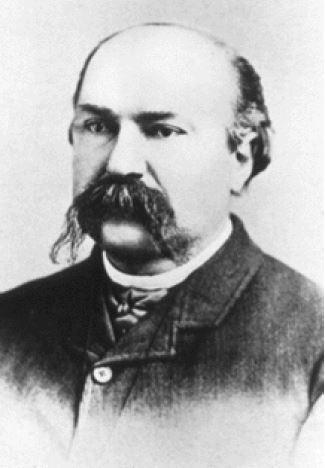Edward Moody McCook
- Territorial Governor of Colorado from 1869-1873 and 1874-1875
- Party: Republican
View a description of holdings held at the Archives
Biography
Appointed as Territorial Governor
Edward Moody McCook, the fifth and seventh governor of the Colorado Territory, was born in Steubenville, Ohio on June 15, 1835. McCook came to Gregory Gulch, Colorado, in 1859, and later moved to Central City to become one of its most prominent lawyers and wealthiest resident.
President U.S. Grant
When Gilpin County came under the control of the Kansas Legislature, McCook was elected its first delegate. McCook, however, heard the call of duty and immediately enlisted in an Ohio regiment when the Civil War began. Like his historic forefathers, often referred to as the "Fighting McCooks," he fought the Confederacy with honor and bravery. His service during the Civil War not only earned him a commission as brigadier general, but also provided him with the opportunity to become friendly with General Ulysses S. Grant. It was McCook's friendship with General Grant, later elected President of the United States, which would define his political future. President Grant's administration, known for its graft and corruption, rewarded McCook's loyalty with an appointment as Minister to the Hawaiian Islands, and later as Colorado's Territorial Governor.
Appointed as Territorial Governor
Despite the success and resounding popularity of the Colorado Territorial Governor Alexander Hunt, President Grant appointed Edward Moody McCook to take Hunt's place on June 14, 1869. Ironically, the successful economic development in Colorado created by the railroads, irrigation canals, and smelting and mining operations did not assist McCook in gaining the favor of the citizenry during his term. Even the fact that the Territorial treasury had a surplus and no taxes were assessed on Coloradans failed to endear McCook to the people he served. He was removed from office by petition, although he was reappointed only a year later. Evidently, the House of Representatives' support for Hunt and Samuel Elbert greatly influenced McCook's demise.
McCook's Term in Office
One of the controversies surrounding McCook's term in office concerned his supposedly favorable treatment of German colonists traveling to the Wet Mountain Valley near Canon City. The development company that lured the colonists to Colorado asked the War Department and Governor McCook for protection and supplies while they journeyed west. The German settlers were subsequently provided with an armed escort, transportation, and tents. Many Coloradans were outraged by the favoritism shown to these foreigners as many other pioneers had taken similar risks without attaining any benefits from the government in order to settle in the Colorado Territory.
Colorado Public School System
With Colorado's rising population and newfound wealth, more schools became necessary. Governor McCook was instrumental in creating the framework for the Colorado public school system. Not only did he create the State School of Mines in Golden and the Colorado School for the Deaf and Blind, but he also provided for the office of Superintendent of Public Instruction. Before 1870 the territorial schools had little funding or standardization and poor record-keeping habits, but with the creation of the Superintendent of Public Instruction position, work could finally begin on the Territory's ailing system of education.
Women's Suffrage
McCook also supported the cause of women's suffrage. In his 1870 message to the legislature McCook said that, "Our higher civilization has recognized women's equality with man in all other respects save one - suffrage...for the logic of a progressive civilization leads to the inevitable result of universal suffrage." McCook's measure to invoke women's suffrage, however, was defeated, not only because it was a controversial issue, but also because of the House of Representative's general opposition to McCook.
Removal from Governorship
Other controversies plagued McCook including matters concerning the Ute Indian Tribe. After Governor Hunt developed a peace treaty and provided a reservation for the Utes, prospectors illegally entered the land looking for lucrative mineral deposits. With the publicized discovery of gold in 1872 on the Ute reservation, federal officials were ordered to protect the Indians from the exploitative miners. Many Americans were sympathetic to the plight of the Indians and favored this policy. Eastern journalists especially advocated the fair treatment of the Indians. However, others, especially many miners and settlers in Colorado, were not convinced that the Indians had any justifiable claim to the land. Representing the white settlers in Colorado, McCook became the logical scapegoat which resulted in his removal from the governorship and Samuel Elbert becoming the territorial appointment. McCook was reinstated on June 19, 1874, but the death of his wife, political upheaval, grasshopper infestations that destroyed Colorado crops and numerous mining disputes created an atmosphere of tension in his administration. Nine months later McCook was once again deposed, and John L. Routt gained the governorship.
Edward Moody McCook died in Chicago in 1909 at the age of 74.
To Request a Record
To search our records, please see Archives Search.
To request a record from the Archives, please submit a formal request.
- See also our associated fees
